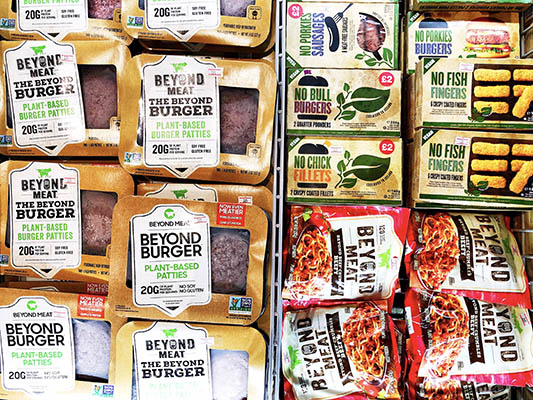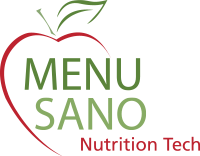Over the past several years, consumer awareness about nutrition has greatly increased. Based on this wide array of information, many diets and food trends have been introduced, including, but not limited to ketogenic, vegetarian, vegan, and Mediterranean. Most recently, however, the plant-based diet has risen greatly in popularity, and plant-based products have become more mainstream, causing curiosity among consumers.
What exactly does “plant-based” mean? What types of foods fit into this diet? A wealth of information is available online regarding this movement, further proving the public’s curiosity and the popularity of “going plant-based.”
The plant-based diet is one consisting primarily or entirely of foods that come from plants. For example, these food products would include vegetables, grains, nuts, seeds, legumes, and fruits. Animal products are either mostly or completely eliminated, depending on the severity of the diet. Meats and cheeses are being replaced with plant-based products, providing more appealing options to consumers who are electing to participate in this movement.
Aside from the health factor, it also appeals to people who are environmentally-conscious and want to live as sustainably as possible. Eating a plant-based diet is very animal-friendly for it does not require the use of these or their products, and supports farms and agriculture as a whole.
Have we piqued your interest? There is so much more to learn about the plant-based diet, its benefits, why so many people find it appealing, and how it has become one of the hottest food trends of 2020.
Read more: 6 Ways Providing Nutritional Value Information Increases Sales and Grows your Food Service Business

Meat Reimagined
For vegetarians and vegans alike, finding adequate sources of protein can be challenging. Even when these options are identified, like beans or veggie burgers, for instance, they are not as appealing or as fulfilling as meat products would be. In recent years, food innovators have taken action to provide more alternatives for these consumers, and have completely reimagined meat as we know it.
Burgers, hot dogs, sausage patties and more, the “Beyond” brand has increased greatly in popularity in the plant-based world over the past several months, even making its way into popular fast-food chains such as Dunkin’ Donuts, McDonald’s, and Burger King. Similarly, the “Impossible Burger” is known for having the appearance of meat, though in reality it still only contains plant ingredients. Popular brands associated with meat, such as Tyson and Smithfield Foods have also launched plant-based products.
This trend is forcing traditional foodservice providers to rethink their offerings and incorporate these products into their menus. There is more to meat alternatives than the health factor, however. Studies show that as soon as the year 2050, the meat industry will not be able to sustain the growing population, estimated to reach 10 billion. Consumers and the industry as a whole have responded to this, as recent studies show that sales of plant-based products could reach $1 billion in 2020.
It is projected that in 2020, more well-known food establishments will incorporate plant-based products into their menus. These businesses include, but are not limited to, Panera Bread, Nando’s, Whole Foods, Hardee’s, Kroger, KFC, and fresh&co. It’s important to keep up with these trends and ensure that your business is staying competitive in today’s market.
Nutrition analysis software will help you accommodate the growing needs of your consumers. Also, having access to technology that will allow you to generate nutrition facts labels can help you highlight your new plant-based dishes, which will garner positive results for your business.
Read more: Best Recipe Nutrition Analysis Method: How to get Nutrition Facts for any Recipe
Some Nutrition Facts About Plant-Based Drinks
Plant-based drinks are another way that consumers can participate in this trend and make it part of their daily lives. Drinks are great for consumers who are constantly on-the-go, and ones that do not want to eat heavy meals. The conversation around this topic has been complex, however. In recent years, different types of plant-based drinks, primarily milk, have come to the forefront of the health conversation (i.e. almond milk, oat milk, soy milk).
Which is healthier? The debate is still open. However, one fact remains the same: milk alternatives are far better for the planet than dairy. Popular chains, particularly those that serve coffee or coffee-based drinks that incorporate milk like Starbucks, Peet’s and Dunkin’ continue to add non-dairy, plant-based alternatives to their menus.
Lower in fat and sugar and higher in protein, these drinks are overall much healthier, sustainable and have risen in popularity among consumers as a result. As an establishment that cares about this new plant-based trend, experimenting with these types of drinks can bode well for your business. It will set you apart from your competitors and help you reach new target audiences.
Read more: Spice it Up! Labelling Dishes according to Scoville Units

The Nutritional Value of Ice Cream
Ice cream is considered to be a delicacy or dessert, and would not necessarily fall under the “healthy food” category. Since it is comprised of animal products, specifically milk, ice cream is very high in fat and sugar. Not only that, but it cannot be consumed by the lactose intolerant population, whose digestive systems cannot process these heavy ingredients. The environmental concerns are prevalent as well since the creation of ice cream relies on cows, which ultimately affects greenhouse gas emissions.
This has resulted in the creation of plant-based ice cream products, which are free from lactose and much lower in fat, sugar and other harmful ingredients. You may have seen some of these brands, such as So Delicious, Eclipse, Reveri, Dream Pops, NadaMoo, Coconut Bliss and Planet Oat. Though they are more expensive than traditional ice cream, they have been consistently flying off the shelves.
There are many ways foodservice providers can incorporate these delicious alternatives to their menus. Some suggestions include:
- Popsicles
- Sundaes
- Milkshakes
- Smoothies
With nutrition analysis software, it’s possible to create healthy dessert alternatives that are both delicious and nutritious for today’s consumers. With this technology, businesses can attract new customers by catering to their dietary requirements with each scoop of ice cream. Foodservice professionals can easily calculate the nutrition content of their desserts and provide their customers with healthy treats and yummy eats.
Read more: Things that MUST be on a Food Label
Conclusion
As a foodservice provider, it can be very challenging to keep up with the latest food trends. The desires of consumers are consistently changing as more information becomes available on nutrition, and what is considered a “healthy” diet.
MenuSano is a nutrition analysis software that will help take your business to new heights. The state-of-the-art software provides countless benefits, the most important being that it gives foodservice providers accurate information about the ingredients they are using in their dishes. As a business, this will allow you to be transparent with your customers and create healthy food to target specific markets.
MenuSano’s nutritional analysis software is a dynamic tool designed to help you take your businesses to a whole new level. By creating and executing new, original recipes, foodservice professionals can use MenuSano to target healthy consumers and be more appealing to a broader customer base. With the plant-based food trend gaining popularity, foodservice providers must educate themselves on recipes that align with this diet. Restaurants can also use MenuSano to generate nutrition facts labels. This allows them to compile valuable and accurate data that can help showcase healthy menu items for their health-conscious customers.
This also allows them to bridge the gap between proper nutrition and sustainability, proving that they are not only in the loop on the latest and greatest food trends but are actively participating in this plant-based movement.



















